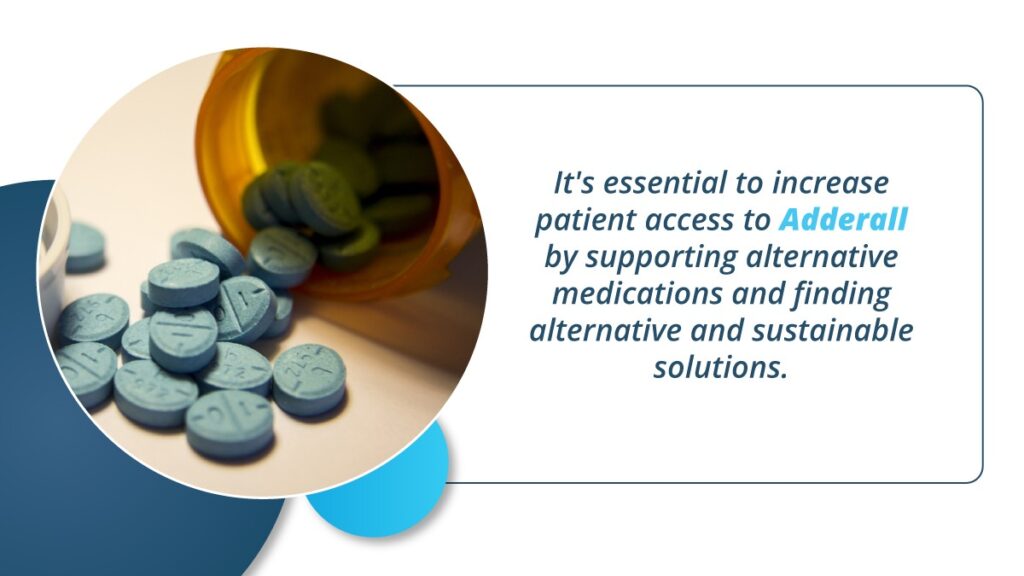
The widespread shortages of Adderall, a commonly prescribed medication for attention-deficit/hyperactivity disorder (ADHD), have been a major concern for patients, doctors, and regulatory authorities alike.
The ongoing shortage of this medication has made it difficult for many individuals to manage their symptoms effectively. While the reasons for these shortages are complex and multifactorial, several strategies can be employed to mitigate the impact of the current situation.
From alternative medications and behavioral therapies to natural remedies and lifestyle changes, many options are available for those struggling with ADHD and affected by the Adderall shortage.
In this blog post, we will explore some of the most effective ways to manage ADHD symptoms and overcome the challenges of Adderall shortages.
Key Takeaways
Managing ADHD symptoms with an Adderall shortage can be a challenge. Here’s what you need to know about Adderall shortages treatment:
- Adderall shortages have been a significant concern for individuals with ADHD.
- It’s essential to increase patient access to Adderall by supporting alternative medications and finding alternative and sustainable solutions.
- Addressing the root cause of Adderall shortages is crucial, and regulatory authorities play a significant role in this issue.
- If someone runs out of ADHD medication, they should consult their doctor.
- A holistic approach can effectively manage symptoms, including medication, behavior therapy, and natural remedies.
If you want help for yourself or your family members, get quality help from The Haven Detox-Little Rock to achieve long-term sobriety. Contact us at (501) 271-3342 to learn more about our treatment programs and service charges.
Understanding Adderall
Adderall is a prescription medication primarily used to treat attention deficit hyperactivity disorder (ADHD) and narcolepsy. It is a central nervous system stimulant that works by increasing the levels of certain chemicals in the brain, such as dopamine and norepinephrine, which are involved in attention and motivation.
The medication comes in two forms: immediate-release (IR) and extended-release (XR). The IR form typically lasts for 4-6 hours and is taken two to three times per day, while the XR form can last for up to 12 hours and is taken once per day.
Adderall is often prescribed to help improve focus, reduce impulsivity, and manage hyperactivity. It can be a highly effective treatment for those diagnosed with ADHD or narcolepsy and can significantly improve their daily functioning.
A Brief Overview of the Recent Adderall Shortages
In recent years, there have been occasional shortages of Adderall in the United States. These shortages have been attributed to various factors, such as production issues, supply chain disruptions, and increased demand.
Shortages of Adderall can be frustrating for patients who rely on the medication to manage their symptoms. They may experience difficulty accessing the medication or be forced to switch to an alternative treatment option.
Patients need to work closely with their healthcare provider or medical agency to manage their treatment plan during times of Adderall shortage. They may be prescribed an alternative medication, such as Ritalin or Vyvanse, or may be advised to try non-pharmacological treatments, such as behavioral therapies, lifestyle changes, or organizational strategies.
Impact of Adderall Shortages
Adderall is a medication widely used to ease attention deficit hyperactivity disorder (ADHD) and narcolepsy. However, recent Adderall shortages in the United States have hurt patients who rely on medication to manage their symptoms.
Adverse Effects of Adderall Shortages on Individuals with ADHD
For those who suffer from ADHD, Adderall can be a highly effective treatment option. It can help improve focus, reduce impulsivity, and manage hyperactivity, which can significantly improve their daily functioning. However, the recent shortages of Adderall have left many patients struggling to manage their symptoms.
Without access to Adderall, patients may experience worsening ADHD symptoms, impacting their ability to perform daily tasks, such as work or school. They may also experience feelings of frustration, anxiety, and helplessness as they cannot access the medication they need to manage their condition.
Not being able to access Adderall can have significant consequences for patients with ADHD. They may experience a decline in academic or work performance and an increased risk of accidents or injuries.
They may also experience social and emotional difficulties, as their symptoms impact their ability to maintain relationships and engage in social activities.
Furthermore, being unable to access Adderall can lead to a decrease in medication adherence, as patients may struggle to find alternative treatment options. This can further exacerbate their symptoms, which can harm their overall quality of life.
Impact On the Overuse of Alternative Medications
During times of Adderall shortage, patients may be prescribed alternative medications, such as Ritalin or Vyvanse, to manage their symptoms. However, the overuse of these medications can lead to a range of negative consequences.
For example, Ritalin is a shorter-acting medication than Adderall, which means that it may need to be taken more frequently throughout the day. This can be inconvenient for patients and may impact their ability to maintain medication adherence. It may also lead to a higher risk of side effects, such as headaches, nausea, and insomnia.
Vyvanse is a long-acting medication that gradually releases the medication over time, which can help reduce the risk of side effects. However, it is also more expensive than Adderall and may not be covered by insurance.
In addition, the overuse of alternative medications can lead to undesirable consequences, such as drug dependency, addiction, and abuse. Therefore, it is important for patients to work closely with their healthcare provider to find the best treatment plan for their needs.
Alternative Treatment Options for Adderall Shortages
With the current Adderall shortages, finding alternative treatment options for attention-deficit/hyperactivity disorder (ADHD) is becoming increasingly important.
While stimulant medications like Adderall are the first line of treatment for ADHD, other options can help manage symptoms, including:
Alternative Medications
Ritalin is a medication that is often used as an alternative to Adderall. It is also a central nervous system stimulant and works by increasing the levels of dopamine and norepinephrine in the brain. However, it is a shorter-acting medication than Adderall, so it may need to be taken more frequently throughout the day.
Vyvanse is another medication that is sometimes used as an alternative to Adderall. It is a long-acting medication that gradually releases the medication over time, which can help reduce the risk of side effects.
Behavioral Therapies
In addition to medication, non-pharmacological treatments can also help manage ADHD symptoms. Behavioral therapies, such as behavior therapy and cognitive-behavioral therapy (CBT), can help patients develop strategies for managing their symptoms and improving their overall functioning.
Lifestyle Changes
Lifestyle changes, such as exercise, a balanced diet, and good sleep hygiene, can also be beneficial for treating ADHD. Organizational strategies, like using a planner, can also help manage ADHD symptoms.
How to Deal with Adderall Shortages
Adderall is a medication used to treat ADHD and narcolepsy. Unfortunately, recent Adderall shortages in the United States have made it difficult for patients to access the medication they need.
Here are some ways to deal with the shortage of Adderall:
Increasing Patient Access to Adderall
One way to deal with Adderall shortages is to increase patient access to medication. This can be done by increasing production, improving distribution channels, and reducing the number of prescriptions that are unnecessarily denied.
To increase production, the federal government can work with pharmaceutical companies to incentivize the production of Adderall. This can include tax breaks, grants, or other forms of financial assistance. The government can also work to streamline the regulatory process to make it easier for pharmaceutical companies to get approval for new Adderall production facilities.
Improving distribution channels can also help increase patient access to Adderall. This can include improving how Adderall is distributed to pharmacies and ensuring that pharmacies are stocked with an adequate supply of the medication.
Supporting Alternative Medications
Another way to deal with Adderall shortages is to support alternative medications. This can include medications like Ritalin, Vyvanse, and Concerta.
Supporting alternative medications can be done by providing patients with information about each medication’s advantages and risks. Healthcare providers can work with patients to find the medication that best fits their individual needs.
Rationing Adderall
Rationing Adderall is another way to deal with Adderall shortages. This can involve prioritizing patients based on the severity of their condition, how long they have been taking Adderall, and other factors.
To ration Adderall, healthcare providers can work with patients to develop a medication management plan. This can include reducing the dose, taking the medication on an as-needed basis, or switching to an alternative medication.
Rationing Adderall can help ensure that patients who need the medication the most are able to access it. However, it is important to note that rationing can be difficult for patients and may lead to a decline in their overall quality of life.
Finding Alternative and Sustainable Solutions
Ultimately, the best way to deal with Adderall shortages is to find alternative and sustainable solutions. This can involve developing new medications, improving the distribution and production of existing drugs, and reducing the overall demand for ADHD medications.
Developing new medications can help ensure patients have access to effective treatments for ADHD. Research and development efforts can focus on developing medications that are more effective, have fewer side effects, and are easier to produce.
Improving the distribution and production of existing medications can also help address Adderall shortages. This can involve working with pharmaceutical companies to improve the manufacturing process, reducing the time it takes to get Adderall to pharmacies, and ensuring that pharmacies are stocked with an adequate supply of the medication.
Reducing the overall demand for ADHD medications can also help address Adderall shortages. This can be done by improving the diagnosis and management of ADHD, reducing the stigma associated with the condition, and promoting alternative treatments like therapy and lifestyle changes.
Addressing The Root Cause of Adderall Shortages
Adderall is a commonly approved medication for patients with ADHD and other mental health conditions. However, recent Adderall shortages have made it difficult for patients to access the necessary medication.
A Closer Look at the Reasons for Adderall Shortages
There are several reasons for Adderall shortages. One of the primary reasons is an increase in the demand for medication. The number of ADHD diagnoses has increased, leading to an increased demand for Adderall and other ADHD medications.
Another reason for Adderall shortages is a lack of raw materials. Adderall is made up of several different ingredients. If any one of these ingredients becomes unavailable, it can lead to a shortage of the medication.
What Led to The Current Situation?
The current situation with Adderall shortages can be traced back to a number of factors. One factor is the increasing number of ADHD diagnoses. As more people are diagnosed with ADHD, the demand for Adderall and other ADHD medications has increased.
Another factor is the lack of raw materials needed to manufacture Adderall. Many of the ingredients used to make Adderall are sourced from outside the United States, which can make it difficult to ensure a steady supply.
Finally, there have been supply chain issues that have contributed to the current Adderall shortages. These issues have included transportation disruptions, manufacturing problems, and distribution challenges.
Exploring The Role of Regulatory Authorities
Regulatory authorities play an important role in addressing Adderall shortages. The U.S. Food and Drug Administration (FDA) is responsible for regulating the production and distribution of medications like Adderall.
One way the FDA can address Adderall shortages is by working with pharmaceutical companies to increase production. The FDA can also work with pharmaceutical companies to ensure an adequate supply of raw materials.
Another way the FDA can address Adderall shortages is by streamlining the regulatory process. By making it easier for pharmaceutical companies to get approval for new Adderall production facilities, the FDA can help increase the supply of the medication.
In addition to the FDA, other regulatory authorities can play a role in addressing Adderall shortages. For example, the Drug Enforcement Administration (DEA) regulates the production and distribution of controlled substances like Adderall. The DEA can work with pharmaceutical companies to ensure an adequate supply of the medication.
Frequently Asked Questions (FAQ)
How do you deal with Adderall shortage?
First, individuals can talk to their doctor or healthcare provider to explore alternative medications or treatment options, such as behavioral therapy or natural remedies. Second, it is important to develop good time management skills and create a structured routine to manage symptoms of ADHD.
Finally, lifestyle changes such as regular exercise, a healthy diet with essential fatty acids, and reducing stress through relaxation techniques like tai chi or green tea can also be helpful. It is important to look up a healthcare professional before trying new treatments.
How long will the Adderall shortage last?
It is tough to predict how long the Adderall shortage will last as it depends on various factors, such as production and supply chain disruptions from drug companies.
However, the FDA has been working closely with manufacturers to address the shortage and increase the availability of the medication. In the meantime, doctors may recommend alternative treatments such as behavioral therapy or other stimulant medications.
While natural remedies and self-help strategies can be effective for some people, working with a medical professional is important to ensure safe and effective treatment. It’s also important to avoid stockpiling medication or sharing it with others, as this can be dangerous and illegal.
What to do if you run out of your ADHD meds?
If you or your child runs out of ADHD medication, there are different ways to manage the symptoms of ADHD. Behavioral therapy, such as cognitive behavioral therapy, is effective for children and adults.
Some parents may prefer a more natural approach instead of taking pills, including regular aerobic exercise, weight loss, or the use of fatty acids found in foods like green tea.
For children, building organizational skills and improving time management can also be helpful. The good news is that there are many effective therapies available for ADHD treatment, and doctors can work with parents to find the best treatment plan for their child’s needs.
Find Professional Help at The Haven-Detox Little Rock
If you are struggling to manage your ADHD symptoms due to the Adderall shortage, don’t suffer in silence. The Haven-Detox Little Rock is here to help you find the support and professional guidance you need to navigate this challenging time.
Our team of experienced professionals understands the unique challenges of living with ADHD and can provide personalized treatment options that fit the individual needs.
We offer effective mental health treatment services, including residential, outpatient, and integrated care treatment programs to manage ADHD symptoms and improve your quality of life.
Our CBT treatment programs allow our patient’s to learn effective strategies from our psychologists to deal with stressful and challenging conditions that can worsen their ADHD symptoms.
In addition, our customer support is available to answer our patients’ questions seven days a week. They guide you in choosing the right treatment facility for your loved one to get the maximum of our dedicated services.
Call us at (501) 271-3342 today to learn more about treatment programs and service charges.



